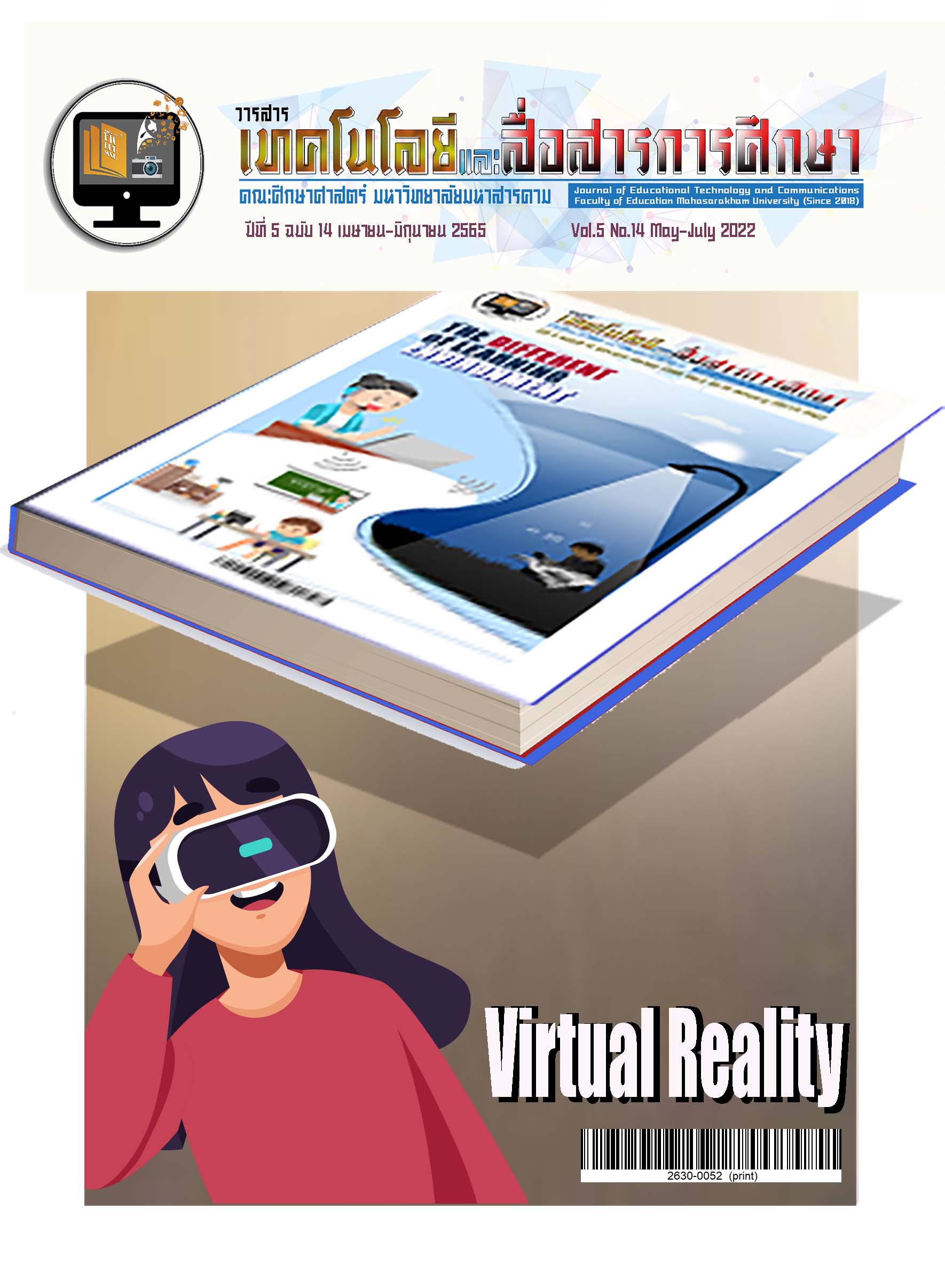การจัดการเรียนรู้โดยใช้แอปพลิเคชันทางดนตรีเพื่อพัฒนาทักษะการบรรเลงกีตาร์คลาสสิก ของนักเรียนชั้นมัธยมศึกษาปีที่ 2
Main Article Content
บทคัดย่อ
การวิจัยนี้มีวัตถุประสงค์เพื่อ (1) เปรียบเทียบความรู้พื้นฐานด้านดนตรีคลาสสิกของนักเรียนชั้นมัธยมศึกษา ปีที่ 2 ก่อนเรียนและหลังเรียนโดยใช้แอปพลิเคชันทางดนตรี (2) เปรียบเทียบทักษะการบรรเลงกีตาร์คลาสสิกของนักเรียนชั้นมัธยมศึกษาปีที่ 2 หลังเรียนโดยใช้แอปพลิเคชันทางดนตรีกับเกณฑ์ร้อยละ 80 และ (3) ศึกษาความพึงพอใจของนักเรียนชั้นมัธยมศึกษาปีที่ 2 ที่มีต่อการจัดการเรียนรู้การบรรเลงกีตาร์คลาสสิกโดยใช้แอปพลิเคชันทางดนตรี กลุ่มตัวอย่างที่ใช้ในการวิจัย ได้แก่ นักเรียนชั้นมัธยมศึกษาปีที่ 2 โรงเรียนสารสาสน์วิเทศราชพฤกษ์ จังหวัดนนทบุรี จำนวน 28 คน ได้มาโดยการสุ่มแบบกลุ่ม เครื่องมือที่ใช้ในการวิจัยประกอบด้วยแผนการจัดการเรียนรู้การบรรเลง กีตาร์คลาสสิกโดยใช้แอปพลิเคชันทางดนตรี มีความเหมาะสมอยู่ในระดับมาก แบบทดสอบความรู้พื้นฐานด้าน ดนตรีคลาสสิก มีความยากง่ายอยู่ระหว่าง 0.30 – 0.70 อำนาจจำแนกอยู่ระหว่าง 0.24- 0.75 และค่าความเชื่อมั่นเท่ากับ 0.86 แบบประเมินทักษะการบรรเลงกีตาร์คลาสสิก มีค่าความเชื่อมั่นเท่ากับ 0.97 และแบบสอบถาม ความพึงพอใจของนักเรียนต่อการจัดการเรียนรู้โดยใช้แอปพลิเคชันทางดนตรี มีค่าความเชื่อมั่นเท่ากับ 0.71 สถิติที่ใช้ในการวิเคราะห์ข้อมูล ได้แก่ ค่าเฉลี่ย ส่วนเบี่ยงเบนมาตรฐาน และการทดสอบค่าที
ผลการวิจัยพบว่า
1) ความรู้พื้นฐานด้านดนตรีคลาสสิกของนักเรียนชั้นมัธยมศึกษาปีที่ 2 หลังเรียนโดยใช้แอปพลิเคชัน ทางดนตรีสูงกว่าก่อนเรียนอย่างมีนัยสำคัญทางสถิติที่ระดับ .05
2) ทักษะการบรรเลงกีตาร์คลาสสิกของนักเรียนชั้นมัธยมศึกษาปีที่ 2 หลังเรียนโดยใช้แอปพลิเคชัน ทางดนตรีสูงกว่าเกณฑ์อย่างมีนัยสำคัญทางสถิติที่ระดับ .05
3) ความพึงพอใจของนักเรียนที่มีต่อการจัดการเรียนรู้โดยใช้แอปพลิเคชันทางดนตรีอยู่ในระดับมาก
Downloads
Article Details
เอกสารอ้างอิง
คณิตา ลิ่มหัน, ไพวรัญ รัตนพันธ์ และ อัญชลี ธะสุข. (2560). ทัศนคติของนักศึกษาครูต่อการเลือกใช้สื่อการเรียนรู้ภาษาอังกฤษ. วารสารวิชาการ มหาวิทยาลัยราชภัฏภูเก็ต, 13(2), https://so05.tci-thaijo.org/index.php/pkrujo/article/view/242861
จิตติวิทย์ พิทักษ์, พงษ์พิทยา สัพโส และ อิศรา ก้านจักร. (2562). สภาพปัญหาเกี่ยวกับการจัดการเรียนการสอนดนตรีของโรงเรียนสาธิตมหาวิทยาลัยขอนแก่น. วารสารศิลปกรรมศาสตร์ มหาวิทยาลัยขอนแก่น, 11(1), https://so02.tci-thaijo.org/index.php/fakku/article/view/199499
ธานินทร์ ศิลป์จารุ. (2560). การวิจัยและวิเคราะห์ข้อมูลทางสถิติด้วย SPSS (พิมพ์ครั้งที่11). บิสซิเนสอาร์แอนด์ดี.
เบญจมาศ พึ่งน้ำ, และ อัมพร วัจนะ. (2563). ผลการเรียนด้วยแอปพลิเคชันสำหรับการเรียนรู้ด้วยตนเองบนสามาร์ทโฟน วิชาวิทยาการคำนวณ เรื่อง แนวคิดเชิงคำนวณ สำหรับนักเรียนชั้นมัธยมศึกษาปีที่ 4 โรงเรียนตกพรหมวิทยาคาร จังหวัดจันทบุรี. ใน การประชุมวิชาการระดับชาติ 2563 นวัตกรรมเพื่อสุขภาพและสังคม ในยุคดิจิตอล. วิทยาลัยนครราชสีมา. 185–194.
ภัทรพล ตันตระกูล. (2561). ผลการเรียนด้วยบทเรียนเอ็มเลิร์นนิง (M-learning) บนอุปกรณ์พกพา เรื่อง สถิติสำหรับวิทยาศาสตร์สุขภาพสำหรับนักศึกษาคณะพยาบาลศาสตร์ชั้นปีที่ 1 มหาวิทยาลัยมหิดล. {วิทยานิพนธ์ปริญญามหาบัณฑิต ไม่ได้ตีพิมพ์] มหาวิทยาลัยศิลปากร.
รมณียา สุรธรรมจรรยา. (2559). ผลการใช้แอพพลิเคชั่นสำหรับสอนคำศัพท์ภาษาอังกฤษบนแท็บเล็ตวิชาภาษาอังกฤษ สำหรับนักเรียนชั้นประถมศึกษาปีที่ 2 สังกัดสำนักงานเขตพื้นที่การศึกษาประถมศึกษาราชบุรี เขต 2. Veridian E-Journal, Silpakorn University (Humanities, Social Sciences and Arts), 9(2)
https://he02.tci-thaijo.org/index.php/Veridian-E-Journal/article/view/66974
ศศี พงศ์สรายุทธ. (2553). ดนตรีตะวันตกยุคบาโรกและยุคคลาสสิก (พิมพ์ครั้งที่2). สำนักพิมพ์แห่งจุฬาลงกรณ์มหาวิทยาลัย.
Bloom, B. (1956). Taxonomy of educational objectives, handbook I: The cognitive domain. David McKay.
Demir, K., & Akipinar, E. (2018). The Effect of Mobile Learning Applications on Students’ Academic Achievement and Attitudes Toward Mobile Learning. Malaysian Online Journal of Educational Technology, 6(2), DOI:10.17220/mojet.2018.04.004.
https://www.researchgate.net/publication/324030616_The_effect_of_mobile_learning_applications_on_students'_ academic_achievement_and_attitudes_toward_mobile_learning
Kabooha, R. H. (2016). Using Movies in EFL Classrooms: A Study Conducted at the English Language Institute (ELI), King Abdul-Aziz University. English Language Teaching, 9(3) https://www.ccsenet.org/journal/index.php/elt/article/view/57540
Thammachard, P (2018). Thailand 4.0 Music Student: Study on Classical Guitar Repertoire Learning Process. The Asian Conference on Education 2018 Official Conference Proceedings, http://papers.iafor.org/wp-content/uploads/papers/ace2018/ACE2018_43185.pdf
Westbrook, J. (2012). The Complete Illustrated Book of the Acoustic Guitar Learning to Play,Chords, Exercises, Techniques, Guitar History, Famous Players, Great Guitars. Lorenz.


